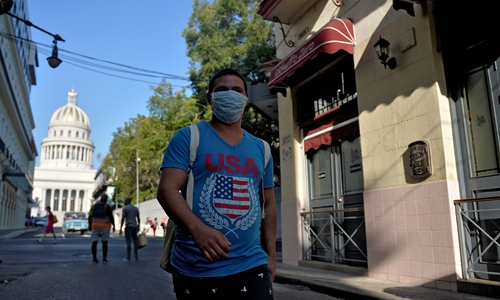HOME >> ARTS
Finish your mojito, we are closed: tourists scramble to leave Cuba
Source:AFP Published: 2020/3/26 16:13:40

A man wears a face mask in Havana, Cuba on Tuesday. Photo: AFP
Nesmi Orslom relished his Cuba vacation to the very end: "In every city that we went, to every bar to have a drink, we always ordered a pina colada or a mojito!"
But he was in a hurry to leave, anxious to get out of a country before it started isolating tourists due to the new coronavirus.
The 34-year-old arrived in Cuba on March 10 for the honeymoon he has spent the better part of a year planning.
Did he picture the trip ending up like this?
"Absolutely not," he said.
"When we left the situation was very different than how it is now" - both in the Netherlands, which at that point had not instituted any lockdown measures, and in Cuba, where the first confirmed case was reported March 11.
Orslom was waiting in line at the Air France counter at the airport in Havana, hoping to find a flight out before the lockdown came into effect on Tuesday.
Cuba - which has so far counted 40 cases of the new coronavirus, which the government says have all been "imported" - has closed its borders to tourists for a month and is isolating those who remain in hotels.
"If we can go home today, it will be a relief," Orslom said.
Air France was set to suspend its daily flight from Havana on Wednesday, leaving the embassy to take care of special arrangements.
France's Air Caraibes and Panama's Copa Airlines will also stop their flights the week after. Spain's Iberia and Air Europa have cut back on their services.
As Latin American countries slowly began to close themselves off from the outside world against the threat of the virus over the last few weeks, Cuba continued to try to woo tourists - who brought in $3.3 billion in 2018 - with wide-open borders and touting itself as a safe destination.
Now those tourists wander nervously around Havana airport, looking for flights home, under ads touting the picturesque Varadero beaches, trips in vintage cars and charming Cuban music.
"Better to be confined at home than elsewhere," said 57-year-old Regine Paumer, who arrived from Nantes, France on March 16 with her husband - but without their friends, who canceled at the last minute.
"We don't speak Spanish, a little English," she said. "It's a bit of a hassle."
When President Miguel Diaz-Canel announced on March 20 the move to close the country's borders in just three days, there were 60,000 tourists still on the island, including 5,000 French and 10,000 Canadian travelers.
By Monday, the government said only 32,500 remained: 3,000 French, 1,500 Spanish and several thousand Canadians, according to diplomatic sources.
Sitting on the floor near her suitcase, 26-year-old Alice Careil tried to keep her spirits up.
"I'm a little tan, so we did take little advantage of [the trip]," she said. "After that, it's true that we were a little tense over the last few days."
She and her partner arrived March 14 and had planned to stay until Wednesday.
"We were told to come back to France quickly," she said.
But their Air Caraibes flight was already canceled.
Since then, she has been frustrated.
"We have to register on a list to get a place on Air France," she said. "There are not very many [seats], and there are already 400 names."
She waited at the airport from 9:00 am to 8:00 pm Sunday and came back at 9:30 am Monday.
Tourists were still allowed to stay after Tuesday.
But "things change very quickly," said Careil. "There are some countries, really not far, in South America, that have completely closed their borders. So if things change in two days, we are stuck. We are not going to spend a month here, even if it is really pretty!"
And they would still need to find somewhere to stay. Many homestay casas have closed their doors to tourists, meaning they have to find lodging at state-run hotels, which can be three or four times more expensive.
Slovenian Mara Marinich, 62, was due to go home Tuesday.
"I had a return ticket through Alitalia from Havana to Rome to Trieste, but all of my flights were canceled," she said.
At the casa she was staying, she was told everyone had to leave.
"I don't have the money to buy another ticket," she said, adding "I don't have the money to pay for a hotel."
Posted in: CULTURE & LEISURE,ARTS FOCUS